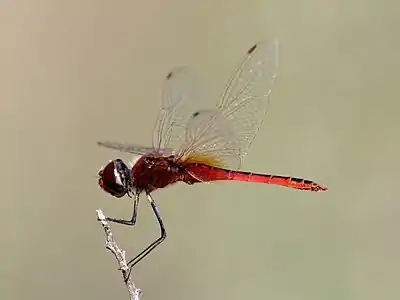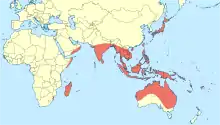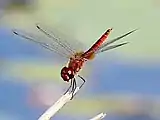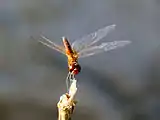| Macrodiplax cora | |
|---|---|
 | |
| Male | |
 | |
| Female | |
| Scientific classification | |
| Domain: | Eukaryota |
| Kingdom: | Animalia |
| Phylum: | Arthropoda |
| Class: | Insecta |
| Order: | Odonata |
| Infraorder: | Anisoptera |
| Family: | Libellulidae |
| Genus: | Macrodiplax |
| Species: | M. cora |
| Binomial name | |
| Macrodiplax cora | |
 | |
| Synonyms | |
| |
Macrodiplax cora,[3] the coastal glider, also known as wandering pennant,[4] and Cora’s pennant,[1] is a species of dragonfly in the family Libellulidae.[1][5][6][7]
Description
An adult male Macrodiplax cora is a medium-sized dragonfly (length 45mm, wingspan 75mm) with a red abdomen, dorsally marked with black patches on each segment. The female abdomen is less brightly colored. The synthorax is a brownish color and may be hirsute. The wings are clear except for a yellowish patch at the base of the hind wing.[4] Its bi-colored legs and hourglass shaped black patches on the abdominal segments will help to easily distinguish them from other red colored dragonflies.[8]
Distribution and habitat
The species undertakes migration and may be nomadic, and is thus widespread in tropical Asia and Australasia. It occurs in South Asia, Australia and a variety of Indian and Pacific Oceans Islands. It prefers coastal lagoons, estuaries and swamps, as it is somewhat salt-tolerant.[8][1]
Gallery
 Male perching
Male perching.jpg.webp) Female perching
Female perching Male, Leichhardt Falls, Queensland
Male, Leichhardt Falls, Queensland.jpg.webp) Female wings
Female wings.jpg.webp) Male wings
Male wings
See also
References
- 1 2 3 4 Sharma, G. (2020). "Macrodiplax cora". IUCN Red List of Threatened Species. 2020: e.T167478A83378965. doi:10.2305/IUCN.UK.2020-1.RLTS.T167478A83378965.en. Retrieved 20 November 2021.
- ↑ Brauer, F. (1867). "Beschreibung neuer exotischer Libellen aus den Gattungen Neurothemis, Libellula, Diplax, Celithemis und Tramea". Verhandlungen der Zoologisch-Botanischen Gesellschaft in Wien (in German). 17: 3–26 [20]. Archived from the original on 2017-03-01. Retrieved 2018-02-21 – via Biodiversity Heritage Library.
- ↑ Paulson, D.; Schorr, M.; Abbott, J.; Bota-Sierra, C.; Deliry, C.; Dijkstra, K.-D.; Lozano, F. (2023). "World Odonata List". OdonataCentral, University of Alabama. Retrieved 14 Mar 2023.
- 1 2 Theischinger, G; Hawking, J (2006). The Complete Field Guide to Dragonflies of Australia. Collingwood Vic.: CSIRO Publishing. p. 254. ISBN 978 0 64309 073 6.
- ↑ "Macrodiplax cora Brauer, 1867". India Biodiversity Portal. Retrieved 2017-02-13.
- ↑ "Macrodiplax cora Brauer, 1867". Odonata of India, v. 1.00. Indian Foundation for Butterflies. Archived from the original on 2016-11-21. Retrieved 2017-02-13.
- ↑ K.A., Subramanian; K.G., Emiliyamma; R., Babu; C., Radhakrishnan; S.S., Talmale (2018). Atlas of Odonata (Insecta) of the Western Ghats, India. Zoological Survey of India. pp. 338–339. ISBN 9788181714954.
- 1 2 C FC Lt. Fraser (1936). The Fauna of British India, including Ceylon and Burma, Odonata Vol. III. Red Lion Court, Fleet Street, London: Taylor and Francis. pp. 448–450.
